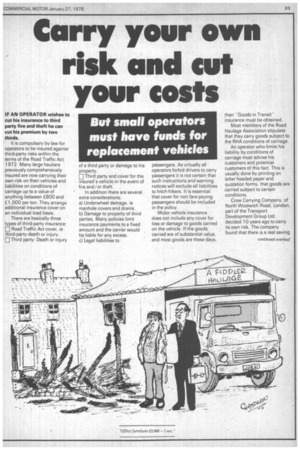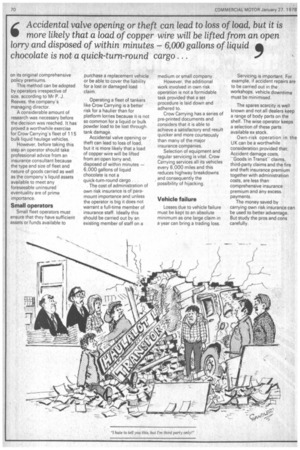Carry your own risk and cut your costs
Page 71

Page 72

If you've noticed an error in this article please click here to report it so we can fix it.
IF AN OPERATOR wishes to cut his insurance to third party fire and theft he can cut his premium by two thirds.
It is compulsory by law for operators to be insured against third-party risks within the terms of the Road Traffic Act 1972_ Many large hauliers previously comprehensively insured are now carrying their own risk on their vehicles and liabilities on conditions of carriage up to a value of anything between £800 and £1,000 per ton. They arrange additional insurance cover on an individual load basis.
There are basically three types of third-party insurance 0 Road Traffic Act cover, ie third-party death or injury. LI Third party Death or injury
of a third party or damage to his property.
E Third party and cover for the insured's vehicle in the event of fire and /or theft,
In addition there are several extra considerations: a) Underwheel damage, ie manhole covers and drains.
b) Damage to property of third parties. Many policies limit insurance payments to a fixed amount and the carrier would be liable for any excess.
c) Legal liabilities to passengers. As virtually all operators forbid drivers to carry passengers it is not certain that such instructions and warning notices will exclude all liabilities to hitch-hikers. It is essential that cover for non fare-paying passengers should be included in the policy.
Motor vehicle insurance does not include any cover for loss or damage to goods carried on the vehicle. If the goods carried are of substantial value, and most goods are these days,
then -Goods in Transitinsurance must be obtained.
Most members of the Road Haulage Association stipulate that they carry goods subject to the RHA conditions of carriage.
An operator who limits his liability by conditions of carriage must advise his customers and potential customers of this fact. This is usually done by printing on letter headed paper and quotation forms, that goods are carried subject to certain conditions.
Crow Carrying Company, of North Woolwich Road, London, part of the Transport Development Group Ltd, decided 10 years ago to carry its own risk. The company found that there is a real saving on its original comprehensive policy premiums.
This method can be adopted by operators irrespective of size, according to Mr P. J. Reeves, the company's managing director.
A considerable amount of research was necessary before the decision was reached. lt has proved a worthwhile exercise for Crow Carrying's fleet of 115 bulk liquid haulage vehicles.
However, before taking this step an operator should take professional advice from an insurance consultant because the type and size of fleet and nature of goods carried as well as the company's liquid assets available to meet any foreseeable uninsured eventuality are of prime importance.
Small operators
Small fleet operators must ensure that they have sufficient assets or funds available to purchase a replacement vehicle or be able to cover the liability for a lost or damaged load claim.
Operating a fleet of tankers like Crow Carrying is a better risk for a haulier than for platform lorries because it.is not so common for a liquid or bulk powder load to be lost through. tank damage.
Accidental valve opening or theft can lead to loss of load, but it is more likely that a load of copper wire will be lifted from an open lorry and disposed of within minutes — 6,000 gallons of liquid chocolate is not a quick-turn-round cargo . .
The cost of administration of own risk insurance is of paramount importance and unless the operator is big it does not warrant a full-time member of insurance staff. Ideally this should be carried out by an existing member of staff on a medium or small company.
However, the additional work involved in own risk operation is not a formidable task provided that a set procedure is laid down and adhered to.
Crow Carrying has a series of pre-printed documents and considers that it is able to achieve a satisfactory end result quicker and more courteously than many of the major insurance companies.
Selection of equipment and regular servicing is vital. Crow Carrying services all its vehicles every 6,000 miles and this reduces highway breakdowns and consequently the possibility of hijacking.
Vehicle failure
Losses due to vehicle failure must be kept to an absolute minimum as one large claim in a year can bring a trading loss. Servicing is important. For example, if accident repairs are to be carried out in the workshops, vehicle downtime must be minimised.
The spares scarcity is well known and not all dealers keep a range of body parts on the shelf. The wise operator keeps a selection of these parts available ex stock.
Own-risk operation in the UK can be a worthwhile consideration provided that: Accident damage costs, "Goods in Transitclaims, third-party claims and the fire and theft insurance premium together with administration costs, are less than comprehensive insurance premium and any excess payments.
The money saved by carrying own risk insurance can be used to better advantage. But study the pros and cons carefully.




















































































































